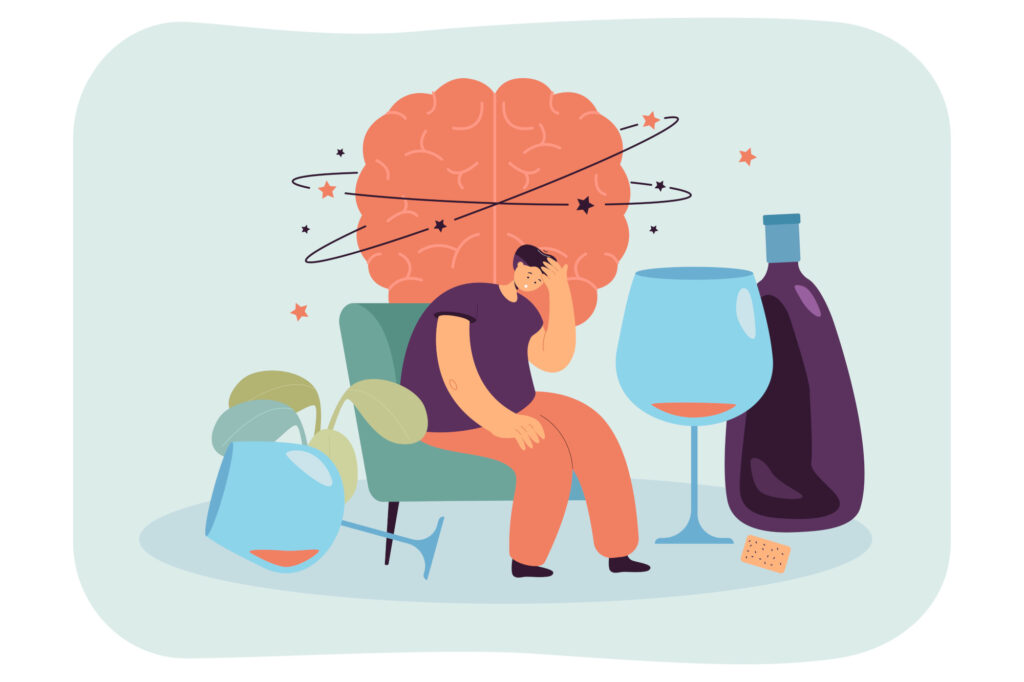Alcoholism is cunning, it’s baffling, and its influence can lead to tremendous highs and horrifying lows. People in the throes of alcohol addiction will commonly admit to feeling a loss of control – and this extends to managing emotions. Very often, alcohol overuse or misuse can lead individuals to do or say things they would never even consider, had alcohol not been in the equation. Understandably, this unpredictable alcohol-fueled behavior can be devastating to the individual, as well as to family members and friends that surround them. In many instances, someone under the influence of alcohol can viciously lash out, leaving loved ones thinking, “Why are alcoholics mean to the ones they love?”
At The Ohana, our compassionate team has first-hand knowledge about the complex relationship between alcoholism and emotional well-being. We’re here to answer your questions about anger and irritability, as a consequence of alcohol abuse.

How Alcohol Affects the Brain: Why Are Alcoholics Mean?
Why are alcoholics so mean? First, it’s critical to understand alcohol’s influence on the user’s brain.
Alcohol has a significant impact on brain chemistry and emotional regulation. Chronic alcohol use disrupts neurotransmitters, which are responsible for mood and behavior, leading to irritability, aggression, and mood swings. Additionally, many individuals struggling with alcoholism may experience feelings of self-disgust, shame, guilt, and fear, which can manifest as anger and hostility, often misdirected at those closest to them. This behavior is further compounded by the stress and frustration of dealing with the addiction, creating a cycle of negative interactions and emotional responses.
You should know, an “angry drunk,” and his or her treatment towards you while under the influence, is not your fault. If you’re not familiar with the science, chemistry, and effects of alcohol, it can be very easy to blame yourself. Instead, familiarizing yourself with the effects of alcohol on the brain can help you understand why are alcoholics mean at times.
The Emotional Toll of Alcoholism
Alcoholism exerts a considerable emotional toll on individuals, often manifesting as regret, embarrassment, and a negative self-image. These emotions can lead to erratic behavior, including aggression and hostility, particularly towards loved ones.
The strain of coping with alcoholism can also result in mood swings and mental health challenges, as the alcoholic grapples with the impacts of their addiction. This emotional burden not only affects the individual struggling with alcoholism, but also extends to their relationships, causing distress and often damaging interpersonal dynamics.
The Link Between Alcohol and Anger
Alcohol and anger often go hand-in-hand. To someone looking in from the outside of an alcoholic’s life, it might seem that alcohol “flips a switch” in the user’s brain, sparking rage. Indeed, alcohol has been proven to act as a catalyst for anger and aggressive behavior, partly due to its impact on the brain in areas that regulate self-control and inhibition. The “angry drunk” stereotype exists in pop culture for a reason.
When under the influence of alcohol, individuals may find it harder to restrain their emotions, leading to anger outbursts. Additionally, alcohol can exaggerate underlying emotional issues or frustrations, bringing them to the surface in an uncontrolled way. This link between alcohol and aggression is particularly concerning as it not only affects the individual consuming alcohol but also poses risks to those around them.

What is Alcoholic Rage Syndrome?
Alcoholic Rage Syndrome is often referred to as “drunken rage.” It is a phenomenon where an individual exhibits extreme anger and aggression when intoxicated with alcohol. This syndrome is characterized by a significant change in behavior, where a person who might normally be calm and composed becomes verbally or physically aggressive under the influence of alcohol.
For people who love or are living with an alcoholic, this sudden flip in behavior can be bewildering. Alcoholic-fueled outbursts often leave innocent bystanders feeling lost, wondering why are alcoholics mean, or why this loved one is treating them so terribly.
Mental health research reveals that alcohol impairs judgment, lowers inhibitions, and can heighten emotional responses, potentially leading to outbursts of anger and violence. However, it’s also important to note that not everyone who consumes alcohol will experience this kind of reaction. Responses to alcohol often depend on individual factors, including personal history, underlying mental health issues, and the amount of alcohol consumed. Alcoholic Rage Syndrome can be a sign of deeper issues related to alcohol abuse and may require professional intervention and treatment.
Alcoholic Rage Symptoms
Alcoholic rage, or “drunken rage,” manifests through a spectrum of symptoms that signal a loss of control and heightened aggression when under the influence of alcohol. These symptoms may lead you to ask, “Why are alcoholics mean?”
Here are several common symptoms of alcoholic rage:
- Sudden Outbursts
- Physical Violence
- Verbal Abuse
- Irrational Behavior
- Emotional Volatility
Identifying these symptoms can be crucial in understanding when alcohol is contributing to destructive behavior, and can help you recognize the need for intervention and support.
How to Deal With a Mean Alcoholic
There are few things as uniquely heartbreaking as caring for someone in the throes of alcoholism. One minute, your loved one seems calm and jovial, and the next, he or she boils over into a fury – leaving you questioning: why are alcoholics so mean and angry?
Dealing with a loved one who is both struggling with alcoholism and displaying mean behavior can be extreme and emotionally taxing. Here are some strategies to help you navigate this difficult situation:
Prioritize Your Safety: First and foremost, ensure your safety and the safety of others around you. If the situation escalates to verbal or physical abuse, it’s crucial to remove yourself from the immediate environment.
Set Boundaries: Expressly communicate your boundaries to the alcoholic in clear, understandable terms. Let them know what behaviors you will not tolerate, and be firm about these limits. Setting boundaries is not just for your well-being but also helps the alcoholic understand the consequences of their actions.
Avoid Escalation: When dealing with mean behavior, try to stay calm and avoid arguments. Arguing with someone who is under the influence is often unproductive and can escalate the situation.
Understand the Disease: Educate yourself about alcoholism. Understanding that this condition is a disease can help you approach your loved one with more empathy and less judgment. Remember, understanding the effects of alcohol on the brain can help you understand why are alcoholics mean and unpredictable at times.
Encourage Professional Help: Gently suggest seeking professional help. Offer to support them in finding treatment options, such as counseling or addiction treatment centers like The Ohana Addiction Treatment Center.
Seek Support for Yourself: Taking care of your mental and emotional health is essential. Consider joining support groups for families of alcoholics, such as Al-Anon, where you can share your feelings and learn from others who are in the same or similar situations.
Practice Self-Care: Ensure you are taking time for yourself. Participate in activities that promote your well-being and provide a respite from the stress of dealing with an alcoholic loved one.
Maintain Hope and Patience: Recovery is a process; change doesn’t happen overnight. Maintaining hope and patience is vital for both you and your loved one during this challenging time.
SIGNS THAT SOMEONE NEEDS HELP WITH ALCOHOLISM
Recognizing the signs that someone may need help for alcoholism is crucial for early intervention and effective treatment. Key indicators include:
- Increased tolerance to alcohol
- Drinking larger quantities
- Drinking for longer periods of time
- Unsuccessful efforts to cut down or control alcohol consumption
- Spending excess time obtaining, using, or recovering from the effects of alcohol
- Neglecting responsibilities at work, home, or school because of drinking
- Continuing to drink despite knowing it’s causing physical or psychological problems
- Withdrawal symptoms when not drinking, such as shakiness, sweating, nausea, and anxiety
If you notice these signs in yourself or a loved one, it’s important to seek professional help, as these are strong indicators that alcoholism may be present. Reach out to us today, and we’ll guide you through the process of talking to your loved one about alcohol treatment.
Getting Treatment for Alcoholism
At The Ohana Addiction Treatment Center, our luxury alcohol rehab program offers a range of services tailored to individual needs, including superior medical detoxification, individual and group therapy, and long-term aftercare planning. Ohana’s approach to recovery focuses on evidence-based modalities to facilitate recovery.
Our treatment programs are comprehensive, addressing not only the physical dependency on alcohol but also the psychological and emotional aspects of the addiction. This full-spectrum approach ensures that the underlying causes of alcoholism are addressed, paving the way for effective and lasting recovery.
Our team at The Ohana understands that loved ones struggle and grapple with questions like, why are alcoholics mean? That’s why we work closely with families and loved ones to help them understand the perplexing consequences of alcoholism. Support from family and friends, alongside professional guidance, creates a strong foundation for overcoming alcoholism. The quest for recovery is unique for each individual, but with the right support and treatment, a life free from alcohol addiction is attainable.

How to Break the Cycle
If you’re tired of living this way, there is hope. The first step is acknowledging the issue and seeking professional help. Educate yourself about the disease, develop healthy coping strategies through your own therapy, and start to rebuild trust and communication within the family. It’s also vital to address underlying emotional issues, practice patience and compassion, and adopt a healthier lifestyle with balanced nutrition and exercise.
Lastly, be sure to celebrate milestones! Acknowledging your progress boosts morale and underscores progress.
Move Forward with Hope and Healing
Understanding why are alcoholics so mean to the ones they love is the first step in addressing the broader issue of alcoholism. The Ohana Addiction Treatment Center focuses on healing the individual and helping our clients mend their relationships. If you or someone you care about feels trapped in the cycle of alcohol and anger, please don’t hesitate to contact us now. A happier, healthier future is available. Let us show you the way there.








